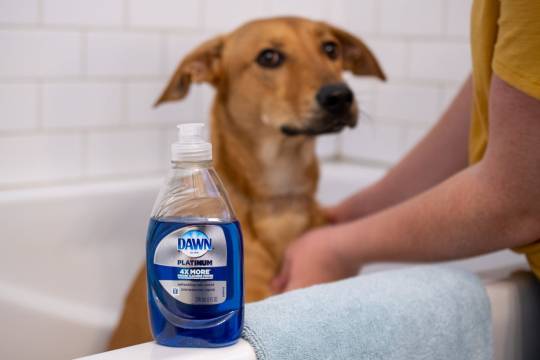Older dogs occasionally develop a cough. But how do you know when your senior dog’s cough is something to be checked?
Connect with a verified veterinarian in minutes. Licensed vets are available 24/7 to answer your questions. No need to worry about your furry family member.
We’ve put together some information on the different causes of coughs in older dogs. And you’ll also find information on when it’s time to call the vet about your fur baby’s cough. Let’s get started!
Reasons an Older Dog May Cough
It’s true that older dogs can develop a cough. It may be nothing more than your dog clearing his airways; however, a cough can also be a sign of a more serious medical condition. In this section, we’ll take a look at some of the most common causes of cough in senior dogs.
1). Kennel Cough
This is a very serious infection in dogs. The cough may sound like the honking of a goose. The dog may also sound as if it’s gagging and hacking. You may suspect this problem if your dog has recently stayed in a kennel with other dogs, been at the dog park, seen the groomer, or been around other dogs in another place. Kennel cough is extremely contagious.
2). Allergies
It’s possible for dogs of any age to develop allergies; however, it’s more common in older dogs. Your dog may seem perfectly normal, aside from the cough. You may notice that he coughs up clear fluid or mucus from time to time. Some dogs may also develop other signs of allergy such as sneezing, watery eyes, itchy, red skin, and more. But that’s not always the case. The only sign of an allergy may be a cough.
The cough may also be caused by asthma in dogs. Luckily, this is a cough that’s easier to treat with corticosteroids (inhaled or pills) or other asthma medications, as well as antihistamines.
3). Canine Influenza
There is a form of canine influenza, called H3N8, which can infect dogs of any age. It’s most often seen in the US and is caused by a flu virus. This is a type of respiratory infection, which can cause coughing, sneezing, and more. The good news is that there is an H3N8 flu vaccine available for dogs.
4). Heartworms
Heartworms are another common cause of coughing in dogs of any age. All it takes to catch a heartworm infection is one bite from an infected mosquito. The insect injects larvae into your dog’s body, where they grow and mature. As they become adults, heartworms will move to live in the heart and lungs. This can lead to coughing. Left untreated, heartworms can kill a dog.
5). Pneumonia
There are two forms of pneumonia that can affect a dog—fungal or bacterial. When a dog has pneumonia, he may develop a fever, lack of appetite, lethargy, and a deep, hard cough. This is another condition that must be treated; otherwise, it can lead to death.
6). Lung Cancer
Certain type of cancer, especially lung cancer, is most common in older dogs. Primary lung cancer is rare in dogs; however, it can develop from cancer elsewhere in the body. It can also be caused by secondhand smoke, environmental contaminants, and more.
7). Heart Problems
Heart problems in older dogs can also cause coughing. The type of heart problem may depend on your dog’s breed and size. For instance, large, giant dog breeds are prone to cardiomyopathy. On the other hand, smaller dogs most often develop congestive heart failure and valve disease.
Dogs with a cough caused by heart problems may discharge a white or clear mucus. They may also cough more at night. It’s also possible the dog may develop gums that are a bluish color.
8). Distemper
Distemper is caused by a viral infection, which is extremely contagious. There is a vaccine available that can prevent this horrible disease in dogs.
9). Foreign Object
It’s possible an older dog may have a foreign object caught in his airways. A dog can even develop a chronic cough caused by a foreign object.
Foreign objects can include inhaled dirt/food, grass seeds, grass, and more that become lodged in the airways.
10). Collapsed Trachea
Some dog breeds are prone to develop a collapsed trachea. This is especially true in dogs that are overweight or obese. In this condition, the trachea folds over on itself, which leads to coughing.
11). Laryngeal Paralysis
Laryngeal paralysis is a condition that can cause coughing, panting, or choking after drinking. The nerves and muscles that control the larynx don’t work correctly, which may cause the dog to inhale water or food. This condition can lead to other conditions such as pneumonia.
Symptoms of Coughing in Dogs
You may notice these symptoms if your dog has developed a cough:
- Cough that worsens
- Cough lasting more than five days
- Cough when excited/after exercise
- Cough after drinking or eating
- Cough when lying down and sleeping (can be day and night, though may only appear at night in the beginning)
- Dry, scratchy cough
- Moist, productive cough
- Lethargy
- Fever
- Loss of appetite
If you notice any of these symptoms in your dog, then it’s time to call the vet. Your dog may have an underlying health issue that’s causing the cough. The sooner your dog is diagnosed and treated, the sooner he can start to feel some relief. Never try to treat your dog’s cough on your own. Your dog needs to see a vet as soon as possible.
Note: never use cough medications meant for humans on your dog. Human cough suppressants may be toxic to your dog and/or make his condition even worse.

Review symptoms, medications & behavior to keep your pets healthy with a Vet Online in just minutes.
Ask a Vet Live NowTreatment of Coughs in Senior Dogs
At the vet’s, they will perform a complete physical exam. The vet may also choose to include lab work and x-rays, depending on your dog’s symptoms.
Treatment of your dog’s cough will depend on the vet’s diagnosis. The vet may be able to treat the underlying health condition, as well as your dog’s cough. There are cough suppressants that are made especially for dogs that can help relieve your dog’s coughing.
In some cases, it may be necessary for your fur baby to stay in the hospital for treatment. This is only usually done for more serious health issues.
Whatever the cause, the best way to help your dog’s cough is to see the vet as soon as possible. An early diagnosis of any health issue will have your dog feeling better that much sooner!
Connect with a verified veterinarian in minutes. Licensed vets are available 24/7 to answer your questions. No need to worry about your furry family member.

Kim
Kim is a talented author, who loves animals especially dogs. She engaged in writing books and articles relating to animals a decade ago. Kim resides in Chicago with her husband and son. The family is the proud owner of a dog and a parrot (Jack and Lily). Kim wanted more than these two pets, but her husband put his foot down... She often visits elementary schools to talk to the kids about what she learned about pets and how they could learn from them.
Review symptoms, medications & behavior to keep your pets healthy with a Vet Online in just minutes.
Ask a Vet Live Now



